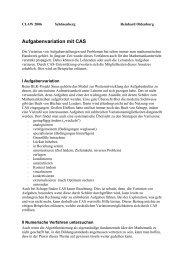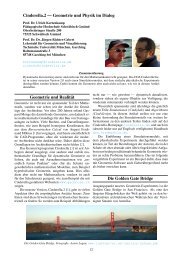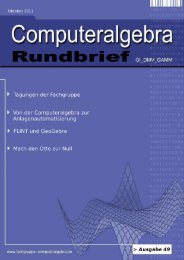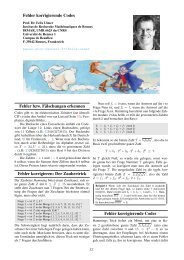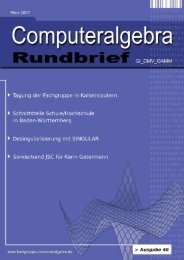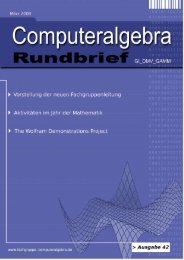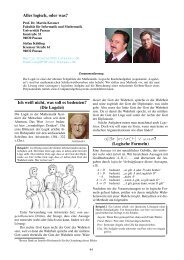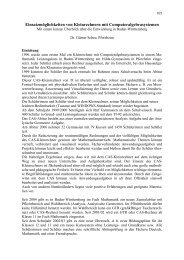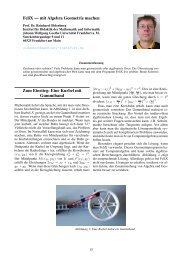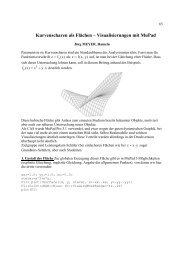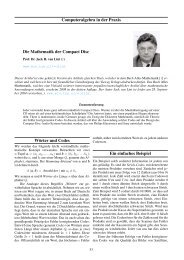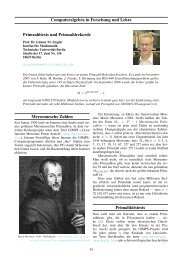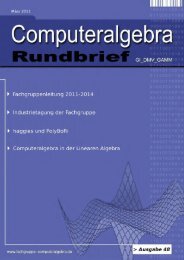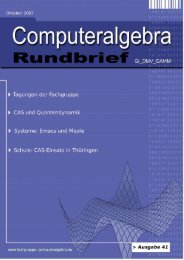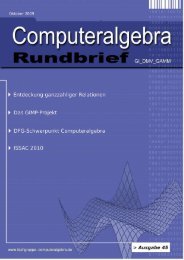Computeralgebra-Rundbrief - Fachgruppe Computeralgebra
Computeralgebra-Rundbrief - Fachgruppe Computeralgebra
Computeralgebra-Rundbrief - Fachgruppe Computeralgebra
Sie wollen auch ein ePaper? Erhöhen Sie die Reichweite Ihrer Titel.
YUMPU macht aus Druck-PDFs automatisch weboptimierte ePaper, die Google liebt.
gave two talks on “Introduction to state space approach” and<br />
“An introduction to the behavioural approach to multidimensional<br />
systems”.<br />
Every day of the five days of the summer school was centered<br />
around a different topic. The first two topics originated<br />
from engineering sciences. Jean-Jacques Loiseau, who has<br />
a strong engineering background, gave several talks about<br />
the historical emergence of these approaches in engineering<br />
sciences.<br />
The last three days were concentrated on the algebraic topics<br />
in control theory. Linear control systems are viewed as<br />
modules over certain rings. The rings are dictated by the type<br />
and the module by the details of the control problem.<br />
Algebraic notions then start to dominate the study of such<br />
systems: torsion submodules, torsion freeness, reflexivity,<br />
projectivity. These properties are tested by usual constructions<br />
from homological algebra: Ext and Tor functors. Supplementary<br />
introduction to basic notions on module theory<br />
and commutative algebra was provided in several night sessions.<br />
The algebraic approach leads to concrete computational<br />
algorithms that were implemented in different packages<br />
by mathematicians from Aachen who gave an introduction<br />
to these packages in one of the night sessions.<br />
Mohamed Barakat (Aachen)<br />
2. Differential Equations and Galois Groups<br />
Oberflockenbach, 02. – 04.10.2003<br />
Die Arbeitsgruppe Algorithmische Algebra des IWR veranstaltete<br />
im Gästehaus der Universität Heidelberg in Oberflockenbach<br />
(Odenwald) im Rahmen des europäischen Netzwerks<br />
Galois Theory and Effective Methods (GTEM) einen<br />
Workshop über die Galois-Theorie von Differentialgleichungen<br />
mit 25 Teilnehmern. Da auch einige (angehende) Doktoranden<br />
teilnahmen, gab es mehrere einführende Vorträge.<br />
Das Programm war wie folgt: Marius van der Put, Introduction<br />
to Differential Galois Theory; Claudine Mitschi, An<br />
Overview on Analytic Aspects of Differential Galois Theory;<br />
Jacques-Arthur Weil, Reduction mod p of Differential<br />
Systems in Practice; Frits Beukers, Introduction to Hypergeometric<br />
Functions in One Variable; Michael Dettweiler,<br />
Riemann-Hilbert Correspondence for Rigid Local Systems;<br />
Werner M. Seiler, Vessiot Theory of Partial Differential<br />
Equations; Peter Müller, Partial Differential Equations of<br />
Krull Dimension Zero; Thomas Oberlies, Embedding Problems<br />
and Inverse Problems; Maint Berkenbosch, Families<br />
of Differential Equations; Felix Ulmer, Liouvillian Solutions<br />
of Linear Differential Equations; Julia Hartmann, Hrushovski’s<br />
Algorithm; B. Heinrich Matzat, p-adic versus Iterative<br />
Differential Equations.<br />
Werner M. Seiler (Heidelberg)<br />
3. 6. Mitteldeutscher <strong>Computeralgebra</strong>-Tag<br />
Halle, 10.10.2003<br />
Mit der inzwischen sechsten Auflage des Mitteldeutschen<br />
<strong>Computeralgebra</strong>-Tags (MCAT) setzen wir eine Tradition<br />
fort, einmal im Jahr die über ganz Mitteldeutschland verstreuten<br />
<strong>Computeralgebra</strong>iker zu einem Tagesseminar zusammenzuführen.<br />
Traditionell stehen dabei Fachthemen,<br />
neue Entwicklungen bei den großen CAS und das Thema<br />
” CAS in der Schule“ auf der Tagesordnung. Die Vorbereitung<br />
lag wie immer in den Händen von H.-G. Gräbe (Uni<br />
31<br />
Leipzig), P. Schenzel (Uni Halle) und T. Buchanan (FH Merseburg),<br />
die lokale Organisation bei den Hallenser Kollegen.<br />
In diesem Jahr wurden folgende Vorträge gehalten:<br />
R. Achilles (Uni Bologna), Zu Schnittzahlen von Varietäten;<br />
S. Graubner (Ostwald-Gymnasium Leipzig), Über ein Problem<br />
aus der nichtlinearen Optimierung; C. Franke (FH Merseburg),<br />
Projektive Rekonstruktion mittels Invarianten von<br />
sechs Punkten aus drei unkalibrierten Bildern; S. Graubner<br />
(Ostwald-Gymnasium Leipzig), Neues in Maple 9; A. Brenner<br />
(Albert-Schweitzer-Gymnasium Erfurt), Probleme beim<br />
Problemlösen im Mathematikunterricht mit CAS; T. Pries<br />
(MLU Halle), Zur Parallelisierung der Faktorisierung mit<br />
ECM; H.-G. Gräbe (Uni Leipzig), Primes ist in P – Aktuelle<br />
Entwicklungen.<br />
Im Vorfeld dieses CA-Tages wurde außerdem eine Mailingliste<br />
aufgesetzt, die diese Aktivitäten begleitet. Interessenten<br />
können sich unter http://ais.informatik.<br />
uni-leipzig.de/mailman/listinfo/compalg<br />
subskribieren.<br />
Hans-Gert Gräbe (Leipzig)<br />
4. ITMC 2003 – Innovative Teaching of Mathematics<br />
Kyoto, Japan, 20. – 22.11. 2003<br />
The conference enjoyed the hospitality of the Research Institute<br />
for Mathematical Sciences (RIMS), Kyoto University<br />
in the very beautiful autumn season. The historic Kyoto as<br />
the ancient capital of Japan was enjoyed by all participants.<br />
There were around 40-50 participants from the US, Germany,<br />
The Netherlands, Italy, Spain, Australia and most notably<br />
Japan. The attendants came from universities, schools and<br />
private companies.<br />
The conference had a double theme:<br />
1) For the first time ever Clifford geometric algebra for teaching<br />
was investigated in detail. M. Mori gave an enthusiastic<br />
greeting address. Mathematical foundations were explained<br />
by D. Hestenes (Arizona), H. Ishi and S. Gomyo (Yokohama),<br />
Y. Nagatomo (Fukuoka). C. Perwass (Kiel) and L.<br />
Dorst (Amsterdam) showed how to use well-tailored software<br />
(CLUCalc and GAViewer) for teaching geometric algebra.<br />
R. Gonzalez-Calvet (Barcelona) reported from his rich experience<br />
with geometric algebra summer schools for teachers.<br />
G. Sommer (Kiel) gave a wide-ranging survey of applications<br />
in robotic vision. S. Sato (Schlumberger) explained why<br />
he would like to see geometric algebra literature in Japanese.<br />
2) The second focus was on new technology and software<br />
for teaching mathematics. H. Makishita (Tsukuba) introduced<br />
the use of Cabri to strengthen student anticipation and<br />
U. Kortenkamp (Berlin) introduced the interactive geometry<br />
software Cinderella. E. Brehm (Berlin) gave examples of visualizing<br />
algorithms using dynamic geometry (with Cinderella).<br />
E. Hitzer explained how to use geometric algebra and<br />
Cinderella for studying conic sections. H. Uno (Nara), responsible<br />
for Personal Digital Assistant (PDA) development<br />
at Sharp, introduced the latest state of PDA technology and<br />
the wide open opportunities to apply PDAs in learning. An<br />
example is the Cinderella implementation on a Zaurus Linux<br />
PDA. The audience expressed the hope for future PDA<br />
school hardware - robust and affordable for the average student.<br />
Special time was dedicated to tutorials for teachers and to a<br />
free software demo session. This conference would not have<br />
been possible without the dedicated hard work of Prof.



